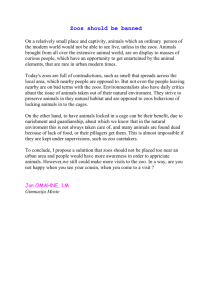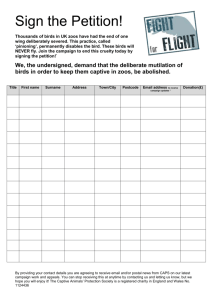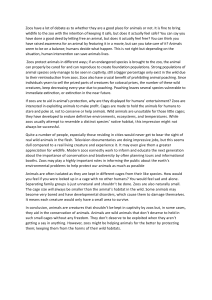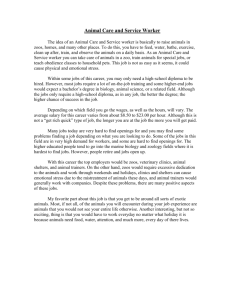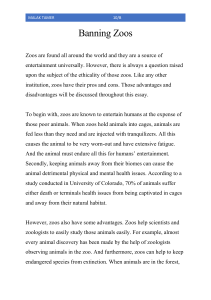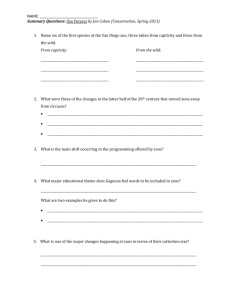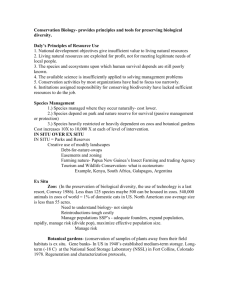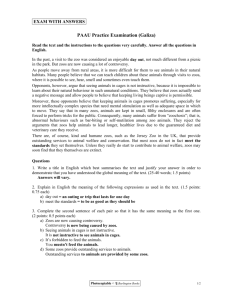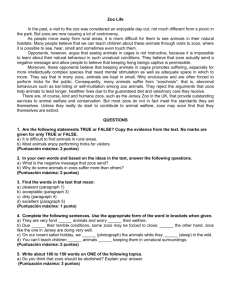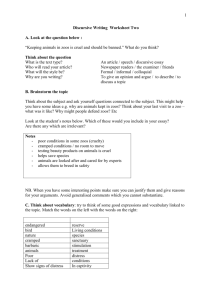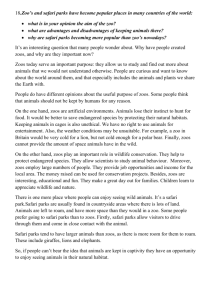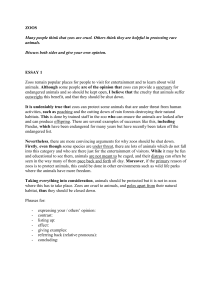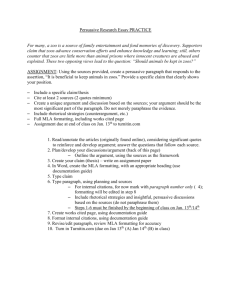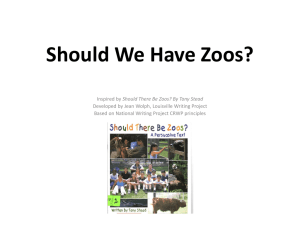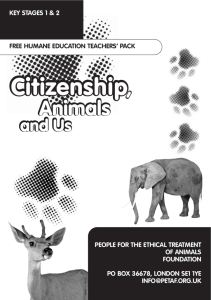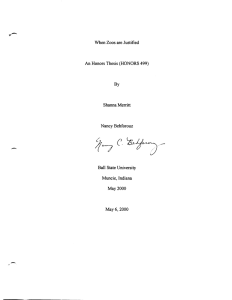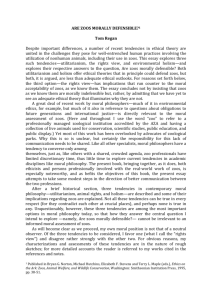Animal rights
advertisement
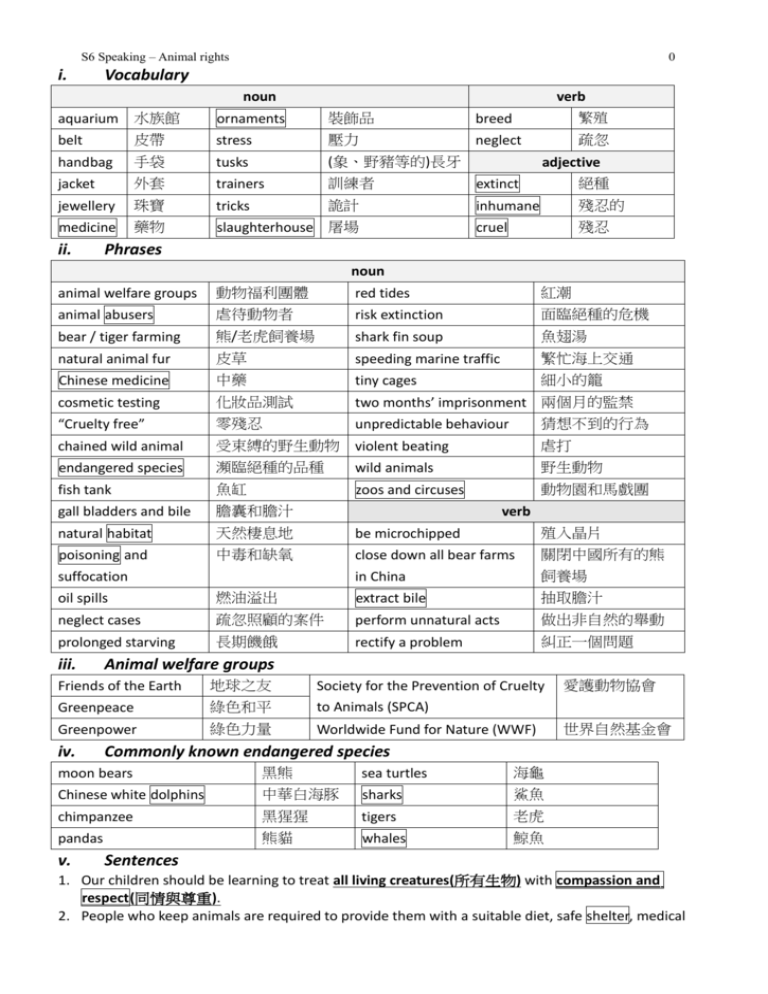
S6 Speaking – Animal rights i. 0 Vocabulary noun aquarium 水族館 皮帶 belt verb 繁殖 ornaments 裝飾品 breed stress 壓力 neglect 疏忽 adjective 絕種 handbag 手袋 tusks (象、野豬等的)長牙 jacket 外套 trainers 訓練者 extinct jewellery 珠寶 tricks 詭計 inhumane 殘忍的 medicine 藥物 slaughterhouse 屠場 cruel 殘忍 ii. Phrases noun animal welfare groups 動物福利團體 red tides 紅潮 animal abusers 虐待動物者 risk extinction 面臨絕種的危機 bear / tiger farming 熊/老虎飼養場 shark fin soup 魚翅湯 natural animal fur 皮草 speeding marine traffic 繁忙海上交通 Chinese medicine 中藥 tiny cages 細小的籠 cosmetic testing 化妝品測試 “Cruelty free” 零殘忍 two months’ imprisonment 兩個月的監禁 猜想不到的行為 unpredictable behaviour chained wild animal 受束縛的野生動物 violent beating 虐打 endangered species 瀕臨絕種的品種 wild animals 野生動物 fish tank 魚缸 zoos and circuses 動物園和馬戲團 gall bladders and bile 膽囊和膽汁 natural habitat 天然棲息地 be microchipped 殖入晶片 poisoning and suffocation 中毒和缺氧 close down all bear farms in China 關閉中國所有的熊 飼養場 oil spills 燃油溢出 extract bile 抽取膽汁 neglect cases 疏忽照顧的案件 perform unnatural acts 做出非自然的舉動 prolonged starving 長期饑餓 rectify a problem 糾正一個問題 iii. Animal welfare groups Friends of the Earth 地球之友 Greenpeace Greenpower iv. verb 愛護動物協會 綠色和平 Society for the Prevention of Cruelty to Animals (SPCA) 綠色力量 Worldwide Fund for Nature (WWF) 世界自然基金會 Commonly known endangered species moon bears 黑熊 sea turtles 海龜 Chinese white dolphins 中華白海豚 sharks 鯊魚 chimpanzee 黑猩猩 tigers 老虎 pandas 熊貓 whales 鯨魚 v. Sentences 1. Our children should be learning to treat all living creatures(所有生物) with compassion and respect(同情與尊重). 2. People who keep animals are required to provide them with a suitable diet, safe shelter, medical S6 Speaking – Animal rights 1 care and the opportunity to behave normally – for example, dogs must be exercised. 3. Most complaints of animal abuse in Hong Kong involve owner negligence(主人疏忽) rather that overt cruelty(畜意的殘忍行為). 4. It is difficult for the police to prove an intention(動機) to be cruel. 5. Being a responsible owner means more than just taking good care of your pet for life. Owners should give their pets good training to control behavior; otherwise, they can create a nuisance(麻 煩事)or even a risk to the neighbourhood. 6. A number of pet owners abandon their animals using excuses(藉口) such as moving house or by claiming they are setting the animal free. 7. Animals are like children – parents should always teach them how to behave in order to help the animal live in harmony(和諧相處) with neighbours. 8. It is high time for us to take animal welfare(動物福利) seriously and bring in a law that will actually deliver on its promise: to protect our animals. 9. Removing sharks from our oceans threatens the balance of marine ecosystems(海洋生態平衡) that over one billion people rely on. 10. Many people are opposed to blood sports such as fox-hunting(獵狐), cock fighting(鬥雞) and bull-fighting(鬥牛). 11. Animal rights activists(動物權益積極分子) often demonstrate(示威) outside various companies because animals are used in experiments(實驗) there. S6 Speaking – Animal rights vi. 2 Discussion Topic 1: The letter below appeared in yesterday’s Young Post The shameful way we treat animals I think the central government was wise to have called on all local authorities to ban animal performances in zoos. Zoos are meant to keep animals safe under love and care. Zoos are also supposed to educate the public about animals, but all we do now is treat them like slaves. Many people use zoos as a form of show business and use animals for profits. We are often told that all people are born equal, but what about the rest of God’s creatures? We are all equal in the Lord’s eyes. No one creature can live without others. The food chain and ecological systems would break down without every link in the chain, and humans are no exception. We should be ashamed of the way we treat animals. Chin Kei-yu Your group is entering an inter-school debate. The motion is “Zoos should be banned because wild animals should not be kept in cages’. Your group does not know whether you will have to speak for or against the motion. You are now preparing for the debate. You may want to talk about: • the reasons why wild animals should not be kept in the cages • how zoos can make the living conditions of the animals better • the benefits of zoos for visitors • anything else that you think is important S6 Speaking – Animal rights 3 Topic 2: The letter below appeared in yesterday’s Young Post Need for tougher animal rights laws I am writing to share my views after reading a newspaper report about the rabbit fur trade. As this is the Year of the Rabbit, many traders are making use of the opportunity to earn more money. Rabbit fur is used in making clothes, handbags and gloves. I’ve also read about rabbits being treated cruelly on the mainland. I think rabbits are lovely pets. We should protect them, not harm or hurt them. What’s more, they were not born for us to make handbags, clothes and gloves from. Animals are like us – they can feel pain. There should be stricter animal rights laws. People need to be educated about protecting animals. They need to develop the right values and have a guilt-free conscience. People should also cherish what they have and stop pursuing luxury items like fur coats and so forth. Janice Lee You are members of an animal rights and welfare organization. You have received a surprise donation of one million dollars to be spent on a campaign for public education and raising public awareness of issues relating to ONE animal. You have to choose one from the following three: sharks Chinese white dolphins moon bears You may want to talk about: - which one you will choose and why - what activities should be included in the campaign - how to promote the campaign - how you will organize the campaign - anything else you think is important
